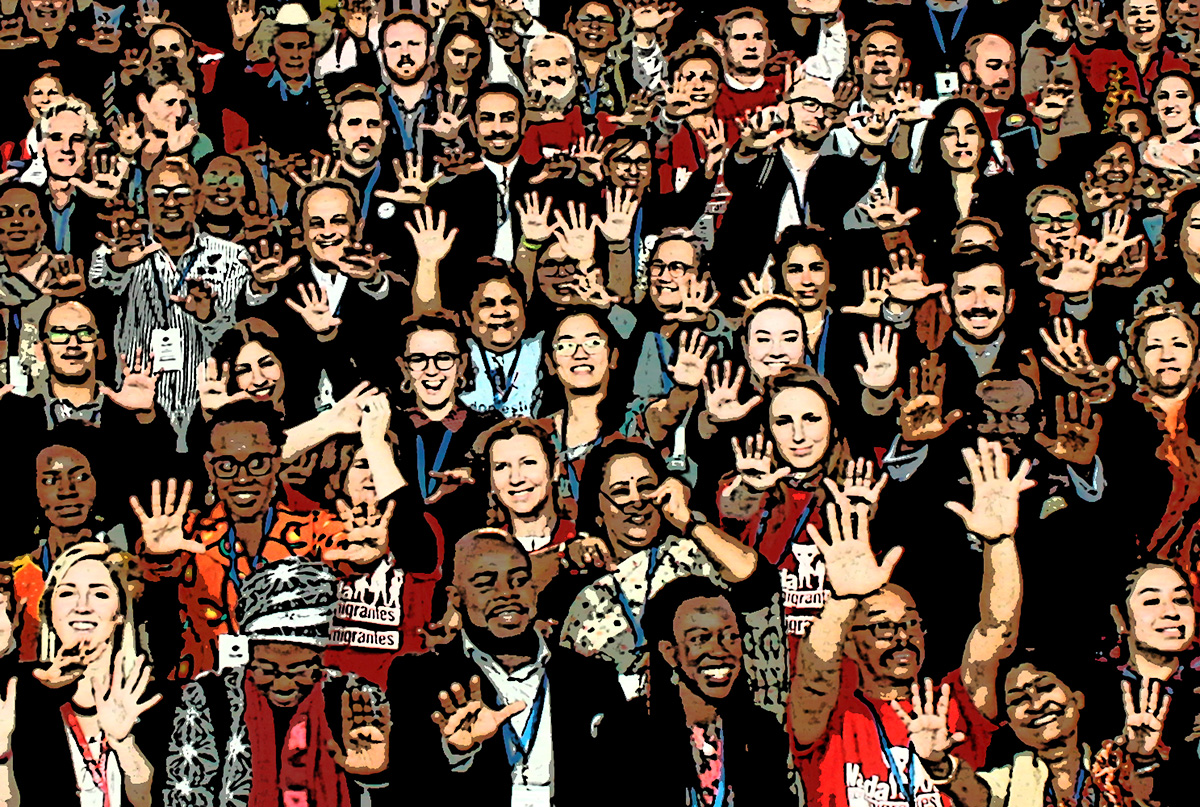The urgency of exposing the root causes of protection gaps affecting migrants, and the need for reliable data for proper policymaking were some of the points lifted up during the first day of the civil society preparatory meeting ahead of the GFMD Summit.
The 2020 GFMD Civil Society Preparatory Meeting opened on 7 January 2021. As in previous years, the purpose of the meeting is to brief and prepare civil society delegates to engage in the Global Forum on Migration and Development (GFMD) Summit, which this year takes place online. Across four days from 7-15 January, some 240 civil society representatives will develop a set of inputs and recommendations to guide their interventions in the Summit.
The meeting was opened by Stéphane Jaquemet, Director of Policy at the International Catholic Migration Commission (ICMC) and head of the GFMD Civil Society Coordinating Office. Jaquemet reflected on the wide-ranging and ongoing consequences of the COVID-19 pandemic, including the disproportionate price paid by migrants and global mobility. He called on civil society to be “a strong and principled voice, and also a partner” in ensuring that recovery measures are “inclusive, gender-sensitive and generate a climate of togetherness.”
Jaquemet noted the positive progress of civil society participation in the GFMD, resulting in the “full multi-stakeholder approach” of the 2021 Summit. “We no longer need Civil Society Days separate but unequal from the GFMD Summit,” he said. However, Jaquemet added: “We still need to meet first among ourselves to be better prepared collectively. This is the very raison d’être of our Civil Society Preparatory Meeting, starting today.”
Day 1 of the preparatory meeting focused on introducing the four thematic areas selected as particularly relevant for civil society input:
- Gaps in Migrant Protection;
- Irregular Migration;
- Governance of Labor Migration, and Skilling of Migrants; and
- COVID-19: Building Back Better for Migrants.
Addressing Gaps in Migrant Protection, Helena Olea of Alianza Americas stressed how the current situation is “not just a pandemic and a global economic crisis, but also a protection crisis for migrants and refugees.”
While highlighting several short-term measures necessary to ensure protection of migrants, she urged that civil society advocacy focuses on responding to the root causes of protection gaps. “We must review immigration legal frameworks and create protective legal regimes,” said Olea, as only by “creating social safety nets that include everyone can we rebuild better for everyone.”
Introducing the Irregular Migration thematic area, Michele LeVoy of the Platform for International Cooperation on Undocumented Migrants (PICUM) noted the tensions between humanitarian-oriented and security-based approaches to this issue.
LeVoy stressed the consequences of irregular status for undocumented persons, and the challenges presented by the absence of a reliable evidence base for policymaking in this area. She noted that the majority of undocumented people become so by losing their legal status post-arrival. LeVoy concluded by emphasizing the gender-based impacts of being undocumented, and the unsustainable reliance of some economic sectors on undocumented labor.
“Only by creating social safety nets that include everyone can we rebuild better for everyone.”
– Helena Olea, Alianza Americas
Introducing COVID-19: Building Back Better for Migrants, Stella Opoku-Owusu of the African Foundation for Development (AFFORD) revisited the four key principles identified by civil society at the outset of the pandemic: saving lives, empowering and partnering with migrant and refugee communities, the right to healthcare and the overall principle of non-discrimination.
Opoku-Owusu mentioned several good practices by States in response to the pandemic, and emphasized both the need to advocate for their continuation, and to explore how they can contribute to long-term structural and developmental change. Rima Kalush of Migrant-Rights.org noted that short-term measures introduced in response to COVID-19 that have negatively impacted migrants should not be “cemented into ongoing practice,” but rolled back.
Presenting the final thematic area Governance of Labor Migration, and Skilling of Migrants, William Gois of Migrant Forum in Asia again noted the lack of reliable data and analysis to support effective policymaking, and the fragmented nature of labor migration governance. He urged that civil society advocacy focuses on empowerment and the rights of labor migrants to self-organize, and on the need for labor migration governance to ensure effective access to justice.
Concluding the session, Gois urged linking the thematic areas of the GFMD via a human-centered framework that emphasizes migrant and refugee rights. Sara Al-Khatib of the Solidarity Center extended this holistic approach in her recommendation for civil society advocacy to take an intersectional approach, within which the multiple discriminations that make migrants and refugees more vulnerable are addressed across all thematic areas.
Photo: Participants at the GFMD Civil Society Days 2019 held in Quito, Ecuador. Due to the COVID-19 pandemic, the Civil Society Preparatory Meeting and GFMD Summit this year are taking place entirely online. © Emilia Burbano de Lara/ICMC

